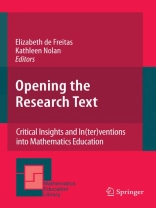In this chapter we interrogate the debate between mathematicians and mathematics educators. This debate is widely recognized in the United States, for instance, where the term ‘math wars’ is often used in reference to the heated disagreements between mathematicians and mathematics edu- tors. Such recognition might suggest that this topic itself has relevance both for the academy and for educational policy pertaining to mathematics edu- tion. We propose to locate this debate, unavoidably, whenever and wherever mathematics education is written. Our aim is to show how the debate itself gives rise to the inscription mathematics education. Indeed, we contend that ‘mathematics education’ cannot be defined outside of, or prior to, the debate, for it is precisely through the debate that it is constituted as a domain for 1 deliberation. The debate is more primordial than any epistémè or domain implied by it. In other words, we argue that mathematics and mathematics education do not exist epistemically prior to the debate. In order to engage this issue we consider a transcription of a panel debate 2 between mathematicians and mathematics educators held in Brazil in 1998 . There is at least a double meaning for the word ‘debate’: it may mean a meeting having a beginning and an end, well-localized in space and time and with a specific proposal or focus, as in the following sentence ‘I am going to see on TV the debate between Bush and Blair tomorrow at 5 pm’.
表中的内容
Foreword to the Research Text: Mathematics Education Under Cross-Examination.- Best Evidence Research Redefined In Mathematics Education.- Psychosocial Processes in Mathematics Education.- The Teacher as Midwife: what can Mathematics Education Research Learn from Obstetrics?.- Mathematics and Mathematics Education–Deconstructing the Math Wars.- Pinning A Problem in Mathematics Education.- Writing as the Intrusive Third Space.- Opening the Mathematics Text: What Does It Say?.- Huh?!.- Opening up the Text–Starting in the Middle.- Timeless Pleasure.- Comforting Narratives of Compliance: Psychoanalytic Perspectives on New Teacher Responses to Mathematics Policy Reform.- The Promise of Disrupting Comforting Narratives of Compliance.- The (Com)Promises of Disrupting Comforting Narratives of Compliance.- Power Distribution in The Network of Mathematics Education Practices.- A Landscape of Power Distribution.- Living the Landscape with/in A Thrice-Told Tale.- Mathematics Education in A Knowledge Market: Developing Functional and Critical Competencies.- More Than Mark(Et) Driven? Scenes from A Continuing Conversation.- Living Mathematically: A Poet’s Response.- Building Political Relationships with Students: an Aspect of Social Justice Pedagogy.- Fear of The Political.- Critiquing Knowledge, Challenging Oppression and Standing in Solidarity in Teacher Education.- A Life for Aprile: Social Justice As A Search of/for the Soul.- Afterword: Bootleg Mathematics.
关于作者
Elizabeth de Freitas is Assistant Professor in the Faculty of Education, University of Prince Edward Island. She teaches elementary, intermediate and secondary Mathematics methods courses. She also teaches courses on Culture and Society and Postmodern Research Theory to Master of Education students. She coordinates a “Narrative Group” for graduate students using various narrative forms of inquiry. Elizabeth’s current research interest include: mathematics teacher identity, critical pedagogy, mathematical discourse and writing, and issues in research methodology.
Kathleen Nolan is Associate Professor in the Faculty of Education, University of Regina. She teaches undergraduate courses in mathematics and science curriculum in both elementary and secondary teacher education programs, as well as graduate courses in curriculum theory. Kathleen’s current research interests include teacher education, mathematics and science epistemology, and critical and narrative research methodologies.












